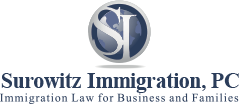How long can someone stay in H-1B status? Is it possible to stay longer than 6 years in H-1B?
H-1B Petitions can be approved in increments of up to 3 years, and can be extended for a second 3-year period, for a total allowable time in H-1B status of 6 continuous years. At the end of six years, H-1B employees are generally required to depart the U.S. for one full year before they can again enter the U.S. to work on a new H-1B visa. However, there are several exceptions to this 6 year maximum period in H-1B. The first exception is that an H-1B employee may “recapture” all time spent out of the U.S. during the relevant 6 year period, and add that time to the end of the 6 years in H-1B. Also, this 6 year limitation does not apply to H-1B employees who reside in the U.S. in H-1B status for less than 6 months per year, or to those whose H-1B employment is seasonal or intermittent. H-1B employees can also get indefinite extensions beyond the 6th year in H-1B provided they are the beneficiary of a Labor Certification Application or Employment-Based Immigrant Petition filed on their behalf prior to the end of the H-1B employee’s 5th year in H-1B status.
What is the Visa for Family Members of H-1B Employees? H-4 Spouses and Children
Spouses and minor children of H-1B employees may accompany their H-1B family member to the U.S. and are granted H-4 status. Generally, spouses and children of H-1B employees in H-4 status may not work in the U.S., without obtaining employment authorization on their own, but may attend school. H-4 status has identical time limitations (six years total) as H-1B status.
Can I get an H-1B if I don’t have a University degree? H-1B Approval Based on Experience in Lieu of Degree “The Three-For-One Rule
As noted above, an H-1B worker can qualify for a professional or “specialty occupation” on the basis of either the attainment of a bachelor’s or higher degree, or on the basis of employment experience that is equivalent to a degree. A “bachelor’s degree” in this context is considered to be a four-year college or university degree from an accredited institute of higher education in the United States, or equivalent academic preparation from an educational institution abroad. The U.S. Immigration Services will generally consider every three years of relevant employment experience as the equivalent of one year of academic preparation towards a four-year degree. Therefore, an individual with no post-secondary education at all could still qualify for H-1B designation if he or she had at least twelve years of relevant employment experience. A prospective H-1B employee with two years of college or university education may still qualify for H-1B status by demonstrating that he or she has had at least six years of relevant experience.
What are the Government Filing Fees for an H-1B Petition? What is “Premium Processing”?
An H-1B Petition is filed by a U.S. employer on Form I-129. The United States Citizenship and Immigration Services (USCIS) requires that all H-1B Petitions (including amended and extended petitions) are subject to the base filing fee $325.00 for Form I-129. All initial H-1B Petitions also require a Fraud Prevention fee of $500.00. In addition, many employers are subject to a $750/$1500 additional fee for filing an H-1B petition. Employers with 25 or fewer full-time employees are generally required to pay the $750.00 additional fee, whereas employers with greater than 25 full-time employees are generally required to pay the $1500.00 fee. Certain employers are exempted from the $750/$1500 fee, and employers should discuss this issue with their immigration attorney to determine this fee’s applicability. Under certain circumstances, because of timing considerations, employers sometimes wish to request expedited processing of an H-1B Petition. In such cases, USCIS provides “Premium Processing” service for an additional fee of $1225.00, and guarantees adjudication within 15 calendar days. It is very important to note that all required government fees must be paid by the employer and not the H-1B employee.
What is Dual Intent for H-1Bs – H-1B Employees who want to be Permanent Residents (get a green card)?
Although H-1B is a temporary “nonimmigrant” visa classification, individuals in H-1B status (and those in L-1 Status) are considered by USCIS to have “dual intent” concerning aspirations of permanent residence, and are not required to maintain a foreign residence. This means that it is permissible and is not inconsistent with one’s H-1B status for an H-1B employee to intend to permanently immigrate to the United States. This is a significant advantage of H-1B classification, relative to those in many other temporary classifications who intend to become permanent residents in the United States. Employers and individuals in H-1B status who are interested in Permanent Residence Through Employment should discuss this issue with their immigration lawyer as soon as possible, as there are important timing considerations to consider.
What is the Numerical Limitation or “Cap” on H-1B Petitions?
The issuance of H-1B visas are limited to 65,000 per fiscal year. Actually, because of agreements with Chile and Singapore which allocate a total of 6,800 H-1B visas to those countries, the H-1B “cap” for nationals of all other countries is actually 58,200. There is also an additional allotment of 20,000 H-1B visas per fiscal year for individuals who have earned a master’s or higher degree from a U.S. institution of higher education. It is important to note that this means these additional 20,000 visas are only for those who earned their master’s or higher degree in the U.S., and not abroad. Because the fiscal year for purposes of allocating H-1B visas begins on the first of October, of each year, and because the maximum time in advance the required LCA (see below) can be submitted or certified is six months in advance of the requested H-1B start date (October 1), there are a flurry of new H-1B petitions filed on April 1 (or the soonest business day thereafter) each year. In recent years, USCIS has held a lottery based on the numerous new H-1B petitions received during the first several days beginning at the start of April.
Certain types of H-1B Petitions are not subject to the annual numerical limitation or “cap” and such H-1B petitions can be filed year-round. Also, certain types of employers, including public schools, institutes of higher educations, many companies and organizations that are “affiliated with” institutes of higher education, and others, are exempt from the cap and can file H-1Bs year round.
Can I Change or Transfer my H-1B Employer? What is H-1B Portability?
An H-1B employee who has already been counted against the annual “cap” on H-1B visas may generally begin working with a new H-1B employer upon the filing of the new employer’s non-frivolous H-1B petition, and generally need not await the new petition’s adjudication. This is provided the H-1B worker had been maintaining H-1B status, had not worked without authorization from USCIS, and that the period of H-1B validity on the previous H-1B petition had not expired.
However, in cases in which the H-1B employee wishing to change employers had not previously been counted against the annual H-1B cap (i.e. previous H-1B employer was exempt from the H-1B cap), the H-1B employee and prospective new H-1B employer will need an available H-1B visa number before the H-1B employee can begin working in new H-1B employment.
What is an LCA (Labor Condition Application and Attestation) and what are the H-1B Wage Requirements?
A Labor Condition Application or Attestation (LCA) is generally electronically submitted on Form ETA 9035E through the Department of Labor’s (DOL) designated website. An LCA is an attestation by a prospective H-1B employer that among other things, the required wage will be paid to the H-1B employee during the entirety of the H-1B employment. The required wage must be the greater of the actual wage the H-1B employer pays to other employees in the company or organization with similar experience and qualifications in the geographic area of the intended H-1B employment or the prevailing wage for the occupation at the position’s skill level and in the geographic area based on the best information available. The Department of Labor provides resources, including its online OES Wage Library, where prevailing wage levels can be calculated.
There are many complex issues related to LCA compliance and H-1B employers should discuss this issue with their immigration attorney as soon as possible prior to preparation and submission of an H-1B petition.
If your questions were not addressed in the H-1B visa FAQs page, please call one of our law offices or contact us today.



